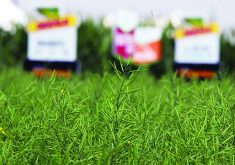Two University of Saskatchewan researchers have been awarded $1.9 million in funding from Genome Canada to pursue work on promising new microbials.
The funding is part of a $16 million research collaboration between the university, Genome Canada and Symbiota, a company from Cambridge, Massachusetts, that develops and commercializes microbials.
“There are remarkable commercial opportunities to be gained through the application of microbial and plant sciences, and Canada’s agriculture industry is leading the way,” said Chris Barker, Genome Prairie’s chief scientific officer.
Jim Basinger, associate vice-president of research at the U of S, said the work of microbiologists Vladimir Vujanovic and Jim Germida builds on an “extraordinary legacy of research” in the department of soil sciences.
Read Also

Farming Smarter receives financial boost from Alberta government for potato research
Farming Smarter near Lethbridge got a boost to its research equipment, thanks to the Alberta government’s increase in funding for research associations.
“Their department has been achieving wonderful things for decades and is recognized nationally and internationally, and they’re carrying on that legacy,” he said.
“They’ve discovered new groups of naturally occurring microbes that can dramatically improve crop yield and stress resistance.”
Germida said scientists from around the world are attempting to create biological inoculants.
“The problem is many of those inoculants will work in greenhouses and small field trials, but they don’t work in large systems because of the variability in the soil, the climate conditions and things like that,” he said.
It’s because they are soil-based microbes.
Germida and Vujanovic are focusing on endophytes, or microbes that reside inside plant roots, stems and leaves.
They have identified community structures of these endophytes and are studying how they interact with one another to see which ones support plant growth when the plant is under environmental stress or nutrient deficiency.
Understanding this interplay between endophyte groups can help the researchers create effective inoculants.
They want to identify endophytes that can be applied with seeds or be impregnated into seeds so that they can colonize plants and either support plant growth or help plants overcome stress.
The researchers have field-tested some of those endophyte groups in Saskatchewan and are pleased with the preliminary findings.
“The results are very exciting and very promising,” said Germida.
Symbiota researchers in the United States, South America and Europe also conducted trials.
“They’re finding that some of the endophytes that we’ve identified have shown great promise,” he said.
The funding from Genome Canada will pay for three more years of field trials.
Inoculants developed from the endophytes will be used on all the world’s major crops, including more than 20 varieties of wheat, barley, pulses and canola.
Germida hopes the project will result in the commercialization of new inoculants in the next five to 10 years.
Dick Flavell, chief scientist with Symbiota, said endophytes have largely been ignored in plant breeding despite the billions of dollars spent by seed technology companies.
“How can this possibly be?” he said.
Flavell, who is one of the pioneers of agricultural biotechnology, said there will be huge benefits to finding the best combination of endophytes for inoculation.
“Only when this is achieved will our crop plants deliver their full potential, especially under conditions of stress,” he said.
“It’s vital to put agriculture on a new path, one that is more holistic, one that is natural, one that recognizes the co-evolution of microbial and plant system in the world.”
Flavell said the big seed technology companies are finally recognizing the importance of microbials, but he feels more nimble companies such as Symbiota have an advantage.
“What small companies that are focused on the area can do is often more than big companies that have to do a very wide range of things, as well as satisfy Wall Street,” he said.
Contact sean.pratt@producer.com


















